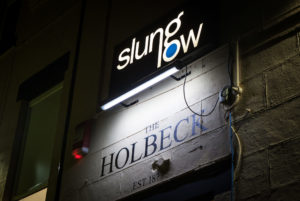‘Relevant Excellence’: Slung Low’s Alan Lane on the future of arts funding
February 21, 2020

Slung Low are a theatre company based in Leeds. Funded by Arts Council England, they recently set up their base in The Holbeck, Britain’s oldest working men’s club. Alan Lane, the company’s artistic director, discusses the work of Slung Low and the Arts Council’s new strategy in this guest piece.
My favourite lie is the one about Churchill replying to the demand to cut arts funding during the Second World War with the phrase, “Then what are we fighting for?”
I love a bit of hyperbole as much as the next person but we didn’t fight the Second World War for a brace of national opera companies or the right to go and watch someone a bit famous off the tele in a Shakespeare play in your local theatre. What is true is that since the Second World War one of the few remaining consensuses we’ve held on to is the idea of public arts funding. For 70 years we have committed as a nation to the idea that the best of artistic experience shouldn’t just be for the rich; resources from the common wealth should be used to ensure that our national cultural life thrives. Broadly speaking, and understanding there’s been some shifts in the amount of funding available during those years, this has held as a shared idea throughout the various governments that have come along. Although there’s been agreement on the principle, the actioning of that has always been contentious.
What makes up ‘the best’? How do you decide that? Who decides that? Does it keep track with current trends or race ahead with innovation? How do you show your working out?
And for a long time that working out has been demonstrated with the word ‘excellence’. Excellence is funded and supported. That’s the criteria. That’s how you determine “the best”.
But there has been a change recently. A new vision from Arts Council England for the next ten years.
Alongside that excellence, there is now a focus on creative people – everyone having the chance to be creative – and creative communities, a great focus on the many different places where people live and placing culture within literal and social reach. Now the watchword “relevance” joins “excellence”.
Excellently relevant. Relevantly excellent.
Change is coming.
But this change will not come as new to many people. For many it will look like a return to a way of valuing culture that they’ve known all their life. I know this because just over a year ago the theatre company I work for, Slung Low in Leeds (funded by the Arts Council for seven years now), took over the oldest working men’s club in Britain – The Holbeck. Under our management the bar still continues, bingo reigns supreme on a Sunday evening and there’s an epic Christmas raffle. All those glorious elements of culture we found when we were invited in still remain but alongside that there is more. A visiting theatre show plays the club every Sunday at 5pm. The Cultural Community College offers courses all year round in everything from bread baking to Irish dancing, from blacksmithying to fire eating. And, alongside family festivals and outdoor activities, a regular cabaret brings in hundreds of South Leeds residents who come to enjoy the finest magicians, drag queens, comedians, poets and bands that Arts Council subsidy can provide. Everything here at the club (apart from the beer) is Pay What You Decide – the audience pay after the event on the way out.

Credit: Simon K Allen
Sometimes, when they haven’t had much to do with a social club before, people ask “how do the members cope with the new stuff?” But we know that it isn’t new, just returning, newly found.
When The Holbeck was created in 1877 it was a lecture hall and a games room. The bar (like as with so many social clubs) would come decades later. When it was first imagined and then created The Holbeck was a place to go to be entertained and to learn. It was first imagined not as a pub but, as the pioneer Joan Littlewood would come to imagine in the 1960s, as a fun palace.
A place, owned by the community, where folk could come together to see the best that the current culture and arts and learning could offer. And there was one in every village, every housing estate, in every community. Part of a clear-eyed vision of national culture that isn’t solely for those that can afford meeting in shiny gleaming buildings in the city centre but a lived, everyday, accessible, owned cultural life. What we’re doing at the club isn’t a new venture but a return to its roots: a social community space, home to art and culture and education, open to all, used by many. Everyday culture.

Credit: Simon K Allen
This new strategy by the Arts Council can clearly be read as a blue print for something that we had in every community but lost in all but the forgotten pockets of the nation where it now survives. Lone clubs managing to ride the waves of an aggressive market and a cultural snobbery that has too long driven the artistic identity of the nation in a London direction, in an institutional direction, in a direction that prizes the university-educated male, white canon above all else.
I choose to see this strategy as a promise by the Arts Council that the culture of the nation will reach the entire nation; that the right to be a creative individual will be offered and protected to every citizen regardless of their proximity to the capital; that culture – the best that can be managed – will be in your community, waiting for you. And not just in your nearest city centre. It is a hell of a promise. It will mean real change. But for some it will mean a return to something we know is possible, of something that we have done before, and in some social clubs and other community halls and spaces hidden away in our communities, still do every day.
You can hear more from Alan and about Slung Low by checking out his blog here.
Filed under: Community, Theatre & Dance
Tagged with: Arts Council England, Arts Council Funding, community, slung low, social club, the arts, the north, theatre



Comments